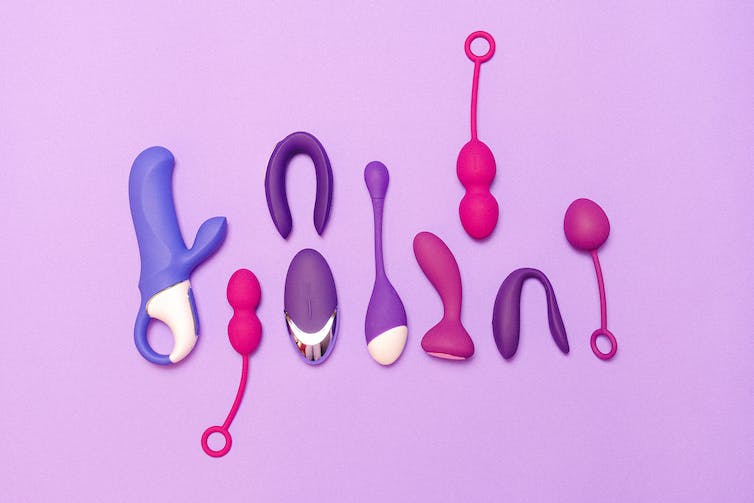
Imagine a steamy sex scene involving a woman and a man from your favourite television show or movie. It’s likely that both parties orgasm. But this doesn’t reflect reality.
Because during heterosexual sexual encounters, women have far fewer orgasms than men. This is called the orgasm gap. And it has been documented in the scientific literature for more than 20 years.
In one study of more than 50,000 people, 95% of heterosexual men said they usually or always orgasm when sexually intimate, while only 65% of heterosexual women said the same.
Research shows that some people believe this gap is because women’s orgasms are biologically elusive. Yet, if this were true, women’s orgasm rates would not differ depending on circumstance. Indeed, many studies show that women orgasm more when alone than with a partner.

This article is part of Women’s Health Matters, a series about the health and wellbeing of women and girls around the world. From menopause to miscarriage, pleasure to pain the articles in this series will delve into the full spectrum of women’s health issues to provide valuable information, insights and resources for women of all ages.
You may be interested in:
Spain is the egg donation capital of Europe – here’s what it’s like to be a donor
‘Dirty red’: how periods have been stigmatised through history to the modern day
How tracking menopause symptoms can give women more control over their health
At least 92% of women orgasm when pleasuring themselves. Women also orgasm more when having sex in relationships compared with casual sex. In a study of more than 12,000 college students, only 10% of the women said they orgasm during first-time hookups while 68% said they orgasm during sex that occurs in a committed relationship.
Women also orgasm more when having sex with other women. In one study 64% of bisexual women said that they usually or always orgasm when being sexually intimate with other women.
Why does this happen?
In all these scenarios where women are climaxing more, there is a greater focus on clitoral stimulation. The majority of women need clitoral stimulation to orgasm – which makes sense given that the clitoris and the penis originate from the same kind of tissue. And both the clitoris and the penis are chock full of touch-sensitive nerve endings and erectile tissue.
In my work, I’ve asked thousands of women: “What is your most reliable route to orgasm?” Only 4% say penetration. The other 96% say clitoral stimulation, alone or paired with penetration.
The main reason for the orgasm gap, then, is that women are not getting the clitoral stimulation they need. And cultural messages about the supremacy of intercourse feed into this. Indeed, countless films, TV shows, books and plays portray women orgasming from intercourse alone.
Popular men’s magazines also give advice on intercourse positions to bring women to orgasm. And while some of the positions do include clitoral stimulation, the message is still that intercourse is the central and most important sexual act.

pixels/mahrael boutros
The language used in these articles – and in the culture as a whole – reflects and perpetuates this overvaluing of intercourse. We use the words “sex” and “intercourse” as if they are the same. We relegate the clitoral stimulation that comes before intercourse as “foreplay”, implying it is a lesser form of sex.
Multiple studies have demonstrated that such messages give the idea that sex should proceed as follows: foreplay (just to get the woman ready for intercourse), intercourse, male orgasm and sex over. In this version of sex, it’s the man’s job to “give” a woman an orgasm by lasting a long time and thrusting hard.
No wonder research finds that men feel more masculine when their partner orgasms during intercourse. And, it’s no surprise that women fake orgasms, primarily during intercourse, to protect their partner’s egos.
Indeed, studies suggest that between 53% to 85% of women admit to faking an orgasm. Some research indicates that the majority of women have faked at least once in their lifetime.
Closing the gap
There is hope though, because given that cultural factors are responsible for the orgasm gap, changing how we view sex and intercourse will help to improve women’s sexual experiences. Indeed, educating people on the fact that women don’t have a limited biological capacity for orgasm is important. Likewise, education for both men and women about the clitoris could be a game-changer.
Still, such knowledge alone is unlikely to close the orgasm gap on a personal level. According to a chapter in a sex therapy textbook, women need skills to put this knowledge into practice. This means women must be encouraged to masturbate to learn what they want sexually. And this needs to be coupled with training in communication so they can share this information with partners.
Women need to feel entitled to pleasure and empowered to get the same type of stimulation alone as with a partner. This means heterosexual couples’ must rid themselves of the old script that calls for foreplay followed by intercourse after which sex is over.
Instead, they can take turns having orgasms using oral sex or manual stimulation where she orgasms followed by intercourse. Alternatively, women can touch themselves with hands or a vibrator during intercourse.
Research shows that women who use vibrators have more orgasms. And because many women worry about how they look during sex or if they are pleasing their partner, research shows that mindfulness can help, too.

Pexels/anna shvets
But orgasm equality is about so much more than quality sex. Multiple women have told me that once they felt empowered in the bedroom, they were more confident in the rest of their life.
Importantly, according to one study, feeling entitled to pleasure increases a woman’s agency in telling partners what they want sexually and their agency in protecting themselves sexually.
Indeed, the study found that feeling entitled to sexual pleasure increased women’s confidence in both refusing to do sexual acts they were not comfortable with and using protection against both pregnancy and sexually transmitted infections.
According to another article on sex education and pleasure by two US health researchers, when young people learn that sex should be pleasurable, they may be less likely to use it in manipulative and harmful ways. So teaching that sex is about pleasure for both partners, rather than something done to women for men’s pleasure, might also help to decrease levels of sexual violence.
Clearly, teaching about women’s pleasure will do more than increase orgasm rates.
![]()
Laurie Mintz does not work for, consult, own shares in or receive funding from any company or organisation that would benefit from this article, and has disclosed no relevant affiliations beyond their academic appointment.
























